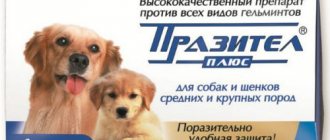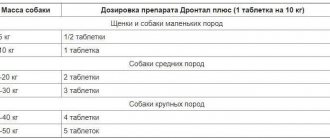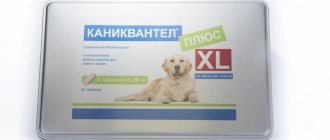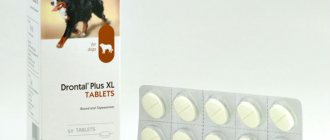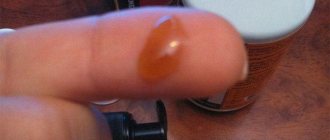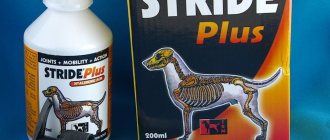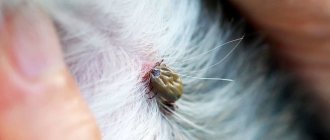| Description of the drug | |
| Release form and storage conditions: | Yellow suspension in 5 ml bottles, store at 10-20°C, shelf life – 3 years |
| Price: | 160-180 rubles |
| Analogues: | Pranathan, Drontal, Febtal |
Description
Prazicide suspension Plus 6 ml for oral use for small breed puppies. As active ingredients, 1 ml contains: 15 mg of pyrantel pamoate, 15 mg of febantel, 1.5 mg of praziquantel and excipients: polyvinylpyrrolidone - 10 mg, glycerin - 50 mg, aspasvit Ts-200 - 5 mg, Tween-80 - 6 mg, xanthan gum – 3 mg, sodium benzoate – 1.5 mg, potassium sorbate – 1.5 mg, antifoam – 0.7 mg, citric acid – 0.5 mg, “Milk chocolate” flavor – 1 mg, Na- carboxymethylcellulose – 3 mg, sucralose – 1 mg, β-cyclodextrin – 5 mg and purified water – up to 1 ml. In appearance, the drug is a light yellow suspension; during storage, separation of the suspension is allowed, which disappears when shaken.
Features of the release form
It is more convenient to give deworming medications in tablets to those whose dogs are accustomed to taking medications in this form. If your pet is not capricious and does not endlessly spit out pills when you give them to him, you can offer him an anthelmintic in this form. In addition, the tablet form of drugs is usually cheaper.
The inconvenience of this form of drug release is that it is difficult to correctly calculate how many parts to divide the tablet into, if necessary. After all, if you give less than necessary, the desired effect will not be achieved, and this can result in unpleasant consequences for the animal, especially before vaccination.
If you significantly exceed the dose of the drug, side effects may occur. They are manifested by excessive lethargy, loss of appetite, apathy and foaming at the mouth. And in this case, you cannot do without a visit to the veterinarian.
Doses and method of administration
The drug is administered to animals orally individually, in the morning feeding with a small amount of food, or forcibly administered to the root of the tongue using a dosing syringe in the following doses: 1 ml per 1 kg of animal weight. For preventive purposes, deworming of animals is carried out once a quarter, as well as before each vaccination. For therapeutic purposes, as well as for the purpose of prevention in group (crowded) keeping of animals (kennels, shelters, vivariums), treatment is carried out twice with an interval of 14 days: for nematodes once a day, for cestodes and mixed nematode-cestodes infestations once a day. day for 3 consecutive days. A preliminary starvation diet and the use of laxatives before deworming are not required. The bottle of suspension should be shaken thoroughly before each use.
Reviews
Owners
“I have a Dogo Argentino kennel, large litters and several times a year. It is very convenient to use this drug. I especially like that it is made in the form of a suspension. It can be easily divided into portions specific to each puppy’s weight.”
“I picked up a puppy on the street. Naturally, he ate anything and it was probably his first deworming in his life. I first saw long and thin worms after going to the toilet. This means the drug really works.”
“When it came time to worm our dachshund before vaccination, I chose the drug Prazicide suspension. Before this I used tablets exclusively. The suspension itself is yellowish in color and not particularly pleasant to the taste. At least the dog was categorically against swallowing it.
As a result, it turned out to be poured not on the root of the tongue, but on the very tip. After some time, a lot of drool appeared, which is not typical for the breed. It may work for others, but we will look for pills.”
Veterinarians
“I have been using this drug for a long time, and as a rule, animals tolerate it well. It is extremely rare in practice that I have encountered an allergic reaction to components.”
“In any case, it is necessary to monitor the activity and general condition after taking the medicine during the first day and, if anything happens, immediately contact a specialist.”
Pharmacological properties
Prazicide-suspension Plus refers to combined anthelmintic drugs. The combination of praziquantel, febantel and pyrantel pamoate, which are part of the drug, provides a wide spectrum of its anthelmintic effect on gastrointestinal nematodes (Toxocara canis, Toxocara cati, Toxocara mistax, Toxascaris leonina, Uncinaria stenocephala, Trichuris vulpis, Ancylostoma caninum) and cestodes (Echinococcus granulosus, Alveococus multilocularis, Mesocestoides lineatus, Dipylidium caninum, Diphyllobotrium latum, Multiceps multiceps), parasitizing puppies. Pyrantel pamoate is a compound of the pyrimidine group, its mechanism of action is based on blocking the transmission of nerve impulses at neuromuscular synapses by depolarizing the membranes of muscle cells, which causes paralysis of the muscular system of nematodes; pyrantel is poorly absorbed, which ensures its prolonged effect on helminths in the intestines; excreted from the body mainly unchanged (93%) in feces. Praziquantel is a compound of the pyrazinisoquinoline group, active against gastrointestinal cestodes at all phases of development. By increasing the permeability of the parasite's cell membranes to calcium ions (Ca2+), it causes membrane depolarization, muscle contraction and tegument destruction, which leads to the death of helminths and promotes their elimination from the animal's body. The compound is rapidly absorbed in the gastrointestinal tract, reaching a maximum concentration in the blood plasma after 1-3 hours, reversibly binds to serum proteins (70-80%), is partially metabolized in the liver, re-excreted into the intestine, and excreted from the body mainly in the urine. (up to 80%) within 24 hours. Febantel belongs to probenzimidazoles, which are biotransformed in the body into benzimidazoles. The mechanism of action of febantel is based on inhibition of the fumarate reductase enzyme in the mitochondria of helminths, as a result of which the absorption of glucose and the synthesis of the protein tubulin are disrupted, which leads to the destruction of the microtubular apparatus of the parasite cells, causing its death. Febantel is absorbed in the intestine, metabolized in the liver and excreted with bile into the intestinal lumen, where its repeated resorption is partially noted, and is excreted from the body both in unchanged form and in the form of several metabolites in feces and urine. Prazicide-suspension Plus, in terms of the degree of impact on the body, is classified as a low-hazard substance (hazard class 4 according to GOST 12.1.007-76), in recommended doses it does not have embryotoxic, teratogenic or sensitizing effects, and is well tolerated by small breed puppies.
Analogs
Anthelmintic drugs from Api-San, similar in action to Prazicide, can be divided into two large groups:
- for external use;
- for internal use.
Prazicide complex for dogs and puppies is a medicine in the form of drops, applied to the withers of animals. In addition to the anthelmintic effect, such drops protect against external parasites and have a prolonged effect.
Dirofen, Dirofen plus, Best Friend, Prazicide - anthelmintics, produced in the form of tablets, with a meat flavor.
Prazicide paste - differs in consistency and can be supplied either through a special syringe dispenser or mixed with food.
Contraindications
A contraindication for use is individual intolerance to the components of the drug (including a history of). Prazicide-suspension Plus should not be used by females in the first half of pregnancy, exhausted animals, patients with infectious diseases and convalescent animals. Deworming of pregnant and lactating females, if necessary, is carried out under the supervision of a veterinarian 3 weeks before the expected birth and 2-3 weeks after birth.
Prazicide-suspension Plus should not be used simultaneously with medications containing piperazine and cholinesterase inhibitors. There is no data on the incompatibility of Prazcid-suspension Plus with drugs of other pharmacological groups and feed additives.
Prazicide suspension Plus is not intended for use in productive animals.
What does the drug help with?
Parasitic diseases are especially common among dogs, because pets are often affected by worms, living in their bodies constantly, but it is not always possible to immediately determine the cause of pain in an animal, and at the same time, the danger of infection awaits a puppy or even an adult anywhere, for example, in meat or in offal.
To do this, you should choose only reliable manufacturers whose products undergo thorough veterinary testing and quality control. If you can protect your pet from low-quality products, then there is no escape from fleas, but they also carry parasites that enter the dog’s body during bites.
For this reason, every dog breeder (regardless of the number of pets) must have an effective drug that can cleanse the animal’s body of worms. Prazicide suspension for dogs is exactly what you need, since this medicine has been known for quite a long time, and even veterinarians speak of it as a good remedy for solving problems associated with helminths.
Manufacturers also confirm that the drug is able to perfectly fight severe forms of the disease, but at the same time it is completely safe for the life and health of the pet, and this applies even to the smallest puppies. Minimum age: 3 weeks.
Side effects
When using Prazicide-suspension Plus in accordance with these instructions, side effects and complications in animals, as a rule, are not observed. Some animals may experience disturbances in the gastrointestinal tract (loose stools, vomiting) and increased salivation, which disappear spontaneously and do not require the use of medications. In case of increased individual sensitivity to the components of the drug and the appearance of allergic reactions, its use is stopped and the animal is prescribed antihistamines and symptomatic therapy.
Indications
Prazicide is specially developed for dogs and is approved for use in puppies at a very young age. Indications for use are preventive and therapeutic actions for gastrointestinal nematodes. Signs of helminth infection in dogs include:
- disruption of the gastrointestinal tract, namely alternating diarrhea and constipation;
- lethargy, refusal to eat, or vice versa, insatiable appetite;
- tearfulness of the eyes.
Symptoms can appear both together and separately, individually for each puppy. But at the initial stage they have a blurry character.
special instructions
In case of an overdose of the drug, the animal may experience a depressed state, refusal to feed, excessive salivation, and gastrointestinal upset. In these cases, enterosorbents and symptomatic therapy are used.
Disturbances in the deworming regimen should be avoided as this may result in decreased effectiveness. If the next dose is missed, the drug must be administered as soon as possible in the same dose, then the interval between administrations of the drug does not change.
Overdose symptoms
Since the active components of the drug belong to the class of low-hazard toxic compounds, they can cause harm to the animal only in case of an overdose. In high doses, the medicine can cause inflammation of the mucous membrane, pharynx and esophagus, even a chemical burn.
This condition can be identified by the following symptoms:
- increased salivation - hypersalivation;
- apathy, lethargy, depression, which may give way to anxiety;
- refusal of food;
- diarrhea or constipation;
- the occurrence of seizures.
In such cases, the animal may need emergency help. It involves detoxifying the body and administering antihistamines.
